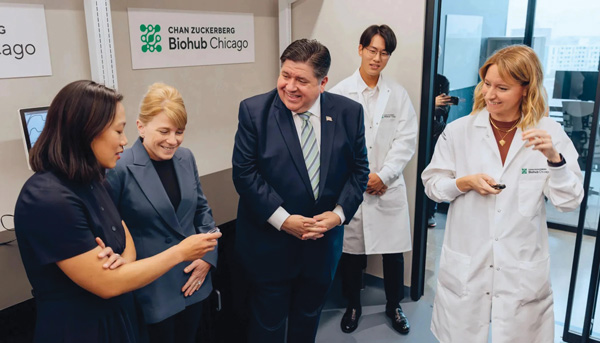Why the Windy City’s life sciences sector is on the rise.
Chicago’s life sciences market has recently become one of the most active areas for new construction in the industry. CommercialCafe’s Top 25 U.S. Metros for Life Sciences report shows that around 1.2 million sq. ft., nearly half of the city’s life sciences real estate, has been added to the market since 2018.
Alongside ranking the metro No. 10, the report largely attributed this industry’s growth to the strength of Chicago’s talent and education system. Approximately 1.2 million people, roughly 18% of residents in the Chicago-Naperville-Elgin metropolitan area aged 25 or older, hold at least a bachelor’s degree in a related field, creating the fourth largest life sciences talent pool among U.S. markets.
Throughout the metro, more than 35 institutions offer industry-related programs or majors, a concentration second only to New York. With multiple renowned research universities fueling this pipeline, many companies are expanding in the Chicago area to meet the talent where it grows.
Attracting Industry Partnerships
By anchoring its second location in Chicago, the Chan Zuckerberg Biohub is bringing together three of Illinois’ leading scientific and technology institutions — the University of Chicago, the University of Illinois Chicago and Northwestern University. Backed by a $250 million investment, the CZ Biohub Chicago launched its research in October 2023, focusing its attention on investigating inflammation and the immune system to identify inflammatory states that underlie many diseases, enabling new, groundbreaking therapeutics.
After a highly competitive year-long application process, the team of Illinois institutions beat out 58 applicants from 172 institutions across the country. Letters of support from political leaders and a $25 million capital commitment from the State bolstered Chicago’s application.
“The Chan Zuckerberg Initiative has recognized what we’ve been promoting and demonstrating to investors and businesses across the globe — when it comes to cutting-edge development and research, there’s no better place to build a top-tier workforce and develop cutting-edge technologies than Illinois and Chicago,” said Gov.Pritzker. “The CZ Biohub Chicago will be an industry-leading scientific research center in the heart of Fulton Market with the support of our local university and workforce talent, and I cannot wait to see what sort of groundbreaking advances in biomedical research will result from this endeavor.”
Turning Concepts into Companies
Outside of the CZ Biohub, Northwestern, University of Chicago, and University of Illinois Chicago are also part of a research collaboration known as the Chicago Biomedical Consortium (CBC).
Launched in 2006, more than $76 million has been invested in CBC initiatives to date, resulting in more than 323 awards granted, over 2,715 research papers published, six national research centers established, and over $920 million dedicated to research funding.
One of the CBC’s most recent wins is the creation of the Chicago Biomedical Consortium Hub for Innovative Technology and Entrepreneurship in the Sciences (CBC-HITES), one of only 13 hubs in the National Institutes of Health’s Research Evaluation and the Commercialization Hub (REACH) program.
“Building on infrastructure developed by the CBC, the new REACH hub connects Chicago medical scientists with the expertise and network they need to develop their ideas into biotech applications,” said primary investigator Satish Nadig, MD, PhD, director of Northwestern’s Comprehensive Transplant Center, chief of organ transplantation in the Department of Surgery, Edward G. Elcock Professor of Surgical Research and professor of Microbiology-Immunology and Pediatrics. “The goal is to get innovative treatments from discovery to patient delivery faster, and we needed a way to teach medical inventors about that process. We’re helping patients and expanding the Chicago-based life sciences ecosystem at the same time through this unprecedented collaborative effort.”
Housed in Northwestern Medicine’s Comprehensive Transplant Center, CBC-HITES will provide access to product development education, industry connections, project management and seed funding necessary for development. Medical researchers at nine Chicago-based institutions are eligible to participate: Northwestern University, The University of Chicago, The University of Illinois Chicago, The Discovery Partners Institute, Illinois Institute of Technology, Loyola University Chicago, Northern Illinois University, Rosalind Franklin University and Rush University.
Backed by an investment of $10.4 million, CBC-HITES offers two funding opportunities, including “early” awards (up to $75,000) for projects that need an enabling experiment and “late” awards (up to $250,000) for more progressed projects.

